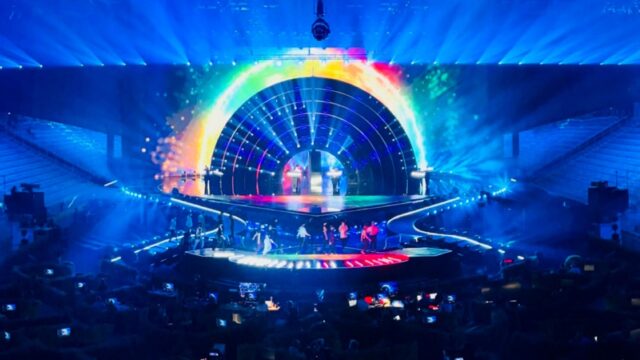Let’s start with something obvious; “United By Music” is a good slogan for the Eurovision Song Contest. With the United Kingdom and Ukraine co-hosting the Song Contest in Liverpool, its choice was noble and justified the grand statement of togetherness.
Now we know that this slogan is going to be used forevermore. The Contest’s Executive Supervisor Martin Österdahl talks about how there will be “consistency in our message” and “underlines our values of inclusivity, equality and universality” going forward. I’d argue that the last sentence from Österdahl explains the rationale best:
“As the popularity of the Eurovision Song Contest continues to grow around the world, we believe using the same slogan annually will help our brand become even stronger.”
Is Risk Still Our Business?
There are many things that the Eurovision Song Contest of today is able to do that it has never done better in its history. The scale of the technical production is up there with the very best in entertainment broadcasting. The reach of the Song Contest across media and social media continues to grow. The ability of the Contest to turn an obscure Finnish-language rapper into the Best Nordic Act winner at the MTV EMA’s is unmatched.
Yet the cliché of ‘the bigger they are, the harder they fall’ haunts any large project such as Eurovision. The Contest of today is such a gigantic and important annual operation that removing risk and ensuring uniformity to the brand is a desirable goal, one that helps the EBU manage the show and every stakeholder’s expectations.
Go back and look at Contests from a generation ago – each scoreboard was unique; each stage design was radically different from the others; and the design of the postcards varied in ways far more diverse than we do today. Today’s Eurovision applies smaller and smaller tweaks to its core product each year as the risk of failure grows. Stages are a great example of this – the risk of a rotating stage for 2022 was a brilliant idea but ultimately didn’t work and damaged many presentations. We won’t be seeing risks like that again any time soon.

The Eurovision 2022 Stage (image: EBU)
Sweden’s Blank Canvas
Malmö’s hosting of Eurovision 2024 provides the perfect platform for making such a change in the approach to the Contest. I mean this without any cat fighting, but Malmö bid won hosting rights by default, as other Swedish cities didn’t have transport links, hotel access or risk-free venues for hosting the show.
Ebba Adielsson, SVT’s Executive Producer for Eurovision 2024, spoke about how the team “quickly realised” that the slogan from the 2023 Song Contest was also a perfect fit this year. After “We Are One” and “Come Together” so recently, I’d argue there’s little soft power influence SVT would wish to push through the medium of the 2024 edition. If anything, making the brand of modern Eurovision more focused going forward fits Malmö’s position as a blank canvas Eurovision host city.
That is because there’s one thing that Sweden’s third city, and the EBU, will be mightily concerned about at the moment.
Money, Money, Money
It has been reported that, in a delicate economic climate for public service broadcasters, delegation fees are set to increase once more for the Song Contest. The EBU reports that the list of participating nations for next year’s Contest, usually public knowledge by this time of the season, is “currently being finalised”. As the community speculates if French Head of Delegation Alexandra Redde-Amiel’s off-the-cuff comment about 41 delegations being set to take part in Malmö is accurate or not, one can imagine that finances are one of the factors at play in any ongoing negotiations.
Not only does having the same slogan strengthen and reduce the risks to brand Eurovision, it also reduces the time, energy and costs of producing each Eurovision Song Contest going forward – lots of small savings can add up when you have such a large budget. I dare say the continued use of “United By Music” reduces the scope of any host broadcaster using an off-brand or easy-to-misinterpret Eurovision slogan to wield their nation’s soft power across the airwaves of Europe. Eurovision is placing itself where its organisation isn’t just a project for different public broadcasters to co-ordinate for others each year, it becomes something bigger than that.
I’ll be the first to say that I love the diversity of different slogans, stages and production feels that give unique qualities to each and every Eurovision Song Contest. But if cementing the good vibes from Liverpool 2023 continues Eurovision’s upward progression as a brand that celebrates music and togetherness, maybe there is a greater good behind something that appears to reduce each host city’s creativity.









